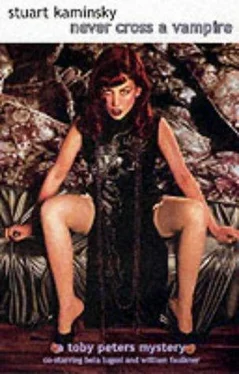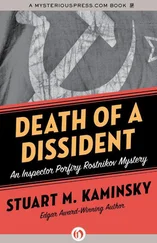Stuart Kaminsky - Never Cross A Vampire
Здесь есть возможность читать онлайн «Stuart Kaminsky - Never Cross A Vampire» весь текст электронной книги совершенно бесплатно (целиком полную версию без сокращений). В некоторых случаях можно слушать аудио, скачать через торрент в формате fb2 и присутствует краткое содержание. Жанр: Криминальный детектив, на английском языке. Описание произведения, (предисловие) а так же отзывы посетителей доступны на портале библиотеки ЛибКат.
- Название:Never Cross A Vampire
- Автор:
- Жанр:
- Год:неизвестен
- ISBN:нет данных
- Рейтинг книги:5 / 5. Голосов: 1
-
Избранное:Добавить в избранное
- Отзывы:
-
Ваша оценка:
- 100
- 1
- 2
- 3
- 4
- 5
Never Cross A Vampire: краткое содержание, описание и аннотация
Предлагаем к чтению аннотацию, описание, краткое содержание или предисловие (зависит от того, что написал сам автор книги «Never Cross A Vampire»). Если вы не нашли необходимую информацию о книге — напишите в комментариях, мы постараемся отыскать её.
Never Cross A Vampire — читать онлайн бесплатно полную книгу (весь текст) целиком
Ниже представлен текст книги, разбитый по страницам. Система сохранения места последней прочитанной страницы, позволяет с удобством читать онлайн бесплатно книгу «Never Cross A Vampire», без необходимости каждый раз заново искать на чём Вы остановились. Поставьте закладку, и сможете в любой момент перейти на страницу, на которой закончили чтение.
Интервал:
Закладка:
“But first on earth, as Vampyre sent,
Thy corpse shall from its tomb be rent;
Then ghastly haunt thy native place,
And such the blood of all thy race…”
His words trailed off and then came back as the record stopped. Lugosi’s voice rose slightly and the half-dozen guys in the bar and the barkeeper went silent. “Thy gnashing tooth, and haggard lip;
Then stalking to thy sullen grave
Go-and with Ghouls and Afrits rave,
Till these in horror shrink away
From spectre more accursed than they.”
That pretty well killed the party. I got Lugosi home without any further conversation, promised to follow up on the Dark Knights, and left him in front of his door. I couldn’t bring myself to ask him for another day’s pay in advance.
CHAPTER TWO
Gunther Wherthman was a little over three feet tall, a genuine midget. At eight in the morning on January 3, 1942 he sat across from me slowly eating a poached egg. I could tell the time not from my watch, which was always an hour or two off, but from the Beech-Nut gum clock on my wall. I had received the clock in payment for returning a runaway grandmother to a guy who owned a pawn shop on Main Street. The job took ten minutes. Grandma was hiding in her closet.
Gunther wore a dark blue suit with not a wrinkle showing and a dark blue tie with some discreet light blue stripes running at a slight angle. He smelled of toilet water and looked ready to go to work, which he was. Work, however, was in the boardinghouse room he lived in next to mine. There was little chance that Gunther, who made a modest living as a translator of German, French, Dutch, Flemish, Spanish, and Basque, would meet anyone during the day except for me and our landlady, who would neither care nor notice what he wore.
Gunther had talked me into the rooming house on Heliotrope in Hollywood after I had gotten him off a murder charge about a year earlier. The murder had been of a guy who played a Munchkin in The Wizard of Oz. Gunther, like most people under four feet tall in the Western world, had been in the movie. In fact, he had picked up a few dollars from time to time doing bit parts in movies that needed little people.
One of his favorite movie jobs had been to simply walk back and forth at the end of a long corridor past another midget. The director’s idea was that no one would notice that the two men were midgets at that distance, and the corridor would look twice as long. Gunther had never bothered to see the movie.
It was Saturday morning and I planned to work, but first I gobbled an oversize bowl of Kix with brown sugar and drank a couple of cups of freshly brewed Schilling coffee I had picked up at Ralph’s for twenty-nine cents a pound.
I discovered that Roosevelt was pushing for war plants to be moved away from the coast because they were vulnerable and that the Russians were holding the Germans sixty-five miles from Moscow in a place called Maloyaroslavets. Corregidor was preparing for a full-scale Japanese attack. Tony Martin had joined the Navy and Hank Greenberg had reenlisted. I found a photograph of Warner Brothers staging an air raid rehearsal. A bunch of sandbags surrounded Mike Curtiz, Dennis Morgan, Bette Davis, “George the Grip,” Irene Manning, and Chet, a worker I recognized from my days at the studio. I showed the photograph to Gunther, who put down his spoon, examined it politely, and nodded.
“And this case is an important one?” Gunther said precisely, when his mouth was empty.
“Well,” I answered, “it’ll pay a few bills, but I think it’s small time, which is just what I’ll be happy with. Dime-a-dozen case of a nut writing a few letters, pulling a few tricks. I’ll probably track him down in a few days, throw a scare, and earn my money.”
Gunther didn’t ask for details. He wiped his mouth with a napkin and climbed down to clean up the meal while I helped myself to another bowl of Kix and made a mental note to pick up a few boxes of Wheaties, which were on sale for ten cents. Life, I thought, could be so simple.
My back hadn’t given me any trouble for weeks. My Sinuses were backed up as they had been for years by my crushed nose, but aside from a few headaches there was no trouble. The bone chip in the little finger of my left hand had shifted, but a few aspirin had helped me to forget it. I had had no migraine since November. The world was full of promise and hope, if you discounted the war.
I had eaten breakfast in my undershirt, not from any desire to offend Gunther, but to preserve the thin veneer of respectability that clung to my shirt, tie, and jacket. With a tight budget, I couldn’t afford cleaning, and I sure as hell couldn’t borrow a shirt from Gunther.
I kicked the mattress I slept on into the corner, got dressed, promised Gunther I’d pick up some Rinso and Horlick’s malted milk, and went out the door and down the stairs as quietly as I could to avoid our deaf landlady, Mrs. Plaut, whose conversations would reduce an FBI agent to creamed spinach.
The newspapers had stopped printing the weather in case it might help the Japanese invasion plans. I had guessed that the day wouldn’t be much warmer than the one before, and I had been right. Being right had simply meant bringing my coat with me. I had only a lighter-weight suit to change into, and that was even dirtier than the one I was wearing.
With twenty bucks of Lugosi’s thirty left after groceries, gas, and an Old Nick candy bar, I drove downtown trying to decide whether to call Carmen and ask her to go to the Pantages with me that night after her shift behind the cash register at Levy’s Grill. The Pantages was running a complete showing of Ball of Fire at 1:30 for defense workers and insomniacs. I was still considering the possibility when I got to the Farraday Building and parked in a spot I know in an alley behind a garbage can. There was always a chance that someone might mistake my heap for discarded scrap, but I risked it.
The lobby of the Farraday was deserted except for Jeremy Butler, the former wrestler, present poet, and landlord, who was using his considerable muscle and a can of Old Dutch cleanser to get some scribbling off the gray wall next to the building directory. The scribbling was vaguely obscene, but some people thought the directory was even worse. We had a bookie posing as a smoke shop, a half-mad doctor who specialized in treating cases he didn’t report, a baby photographer who was even uglier than me and who never carried a camera, a con man named Albertini who changed the name of his company every week (this week it was Federal Newsprint, Ltd.), and a variety of others including Sheldon Minck, DDS, and Toby Peters, the far side of the detective business.
“How’s business, Toby?” Butler said. His sleeves were rolled up for the task, and his arms bulged under fields of black hair.
“Got a client,” I said pausing to try to read what he was erasing but having no luck. “Bela Lugosi. Say, you’re a poet. You know a poem that starts ‘But first on earth as Vampyre sent?”
“It’s not the beginning,” Butler said, attacking what looked like the remnants of an anatomical drawing. “It’s by Lord Byron. He was screwy about vampires. A lot of poets like that stuff. I even wrote a vampire poem.” He stepped back to examine his efforts, didn’t like what he saw, and went back to the wall with cold determination.
“It was published in Little Bay Review last year,” he said.
“Terrific,” I answered and started to move into the darkness and toward the stairs, but his voice, grunting with each scrub, came at me with the poem. I stopped politely to listen.
“Whatever happened to yellow?
Did it bleed to green and mellow to almost white from the gentle bite of a grass-leaf vampire?
Читать дальшеИнтервал:
Закладка:
Похожие книги на «Never Cross A Vampire»
Представляем Вашему вниманию похожие книги на «Never Cross A Vampire» списком для выбора. Мы отобрали схожую по названию и смыслу литературу в надежде предоставить читателям больше вариантов отыскать новые, интересные, ещё непрочитанные произведения.
Обсуждение, отзывы о книге «Never Cross A Vampire» и просто собственные мнения читателей. Оставьте ваши комментарии, напишите, что Вы думаете о произведении, его смысле или главных героях. Укажите что конкретно понравилось, а что нет, и почему Вы так считаете.












